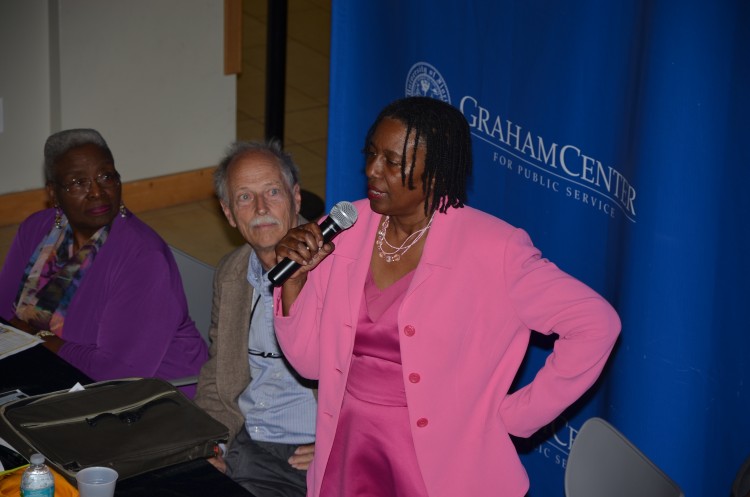March 12, 2014, “The Florida Civil Rights Struggle: Past & Present” panel discussion
By Emily Nyren, Intern alumni and Volunteer
In the News: “UF students get immersed in the history of civil rights,” (opens in new tab) The Gainesville Sun, by Jeff Schweers, March 10, 2014, and “Several give stark accounts of segregation-era racism,” (opens in new tab) The Gainesville Sun, by Jeff Schweers, March 12, 2014.
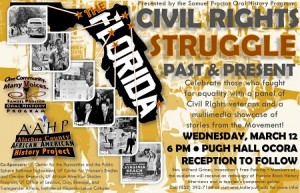 On March 12, 2014, the Samuel Proctor Oral History Program (SPOHP) presented a panel discussion by civil rights veterans to honor the 50th anniversary of the modern civil right movement in Florida. Students read excerpts from SPOHP’s African American History Project (AAHP), providing the audience with more stories of others involved in the movement. AAHP contains oral histories with African Americans in Alachua County, UF, and surrounding areas who grew up during the final decades of legal segregation.
On March 12, 2014, the Samuel Proctor Oral History Program (SPOHP) presented a panel discussion by civil rights veterans to honor the 50th anniversary of the modern civil right movement in Florida. Students read excerpts from SPOHP’s African American History Project (AAHP), providing the audience with more stories of others involved in the movement. AAHP contains oral histories with African Americans in Alachua County, UF, and surrounding areas who grew up during the final decades of legal segregation.
Dr. Ortiz opened the discussion by reflecting on the Florida Civil Rights Movement and asked the audience, “Where do we go from here?” This question was the theme of the evening as panelists one-by-one recounted their individual experiences and commented on the state of civil rights affairs in 2014. The panelists included: Mrs. Vivian Filer, Mr. Dan Harmeling, Mrs. Rosemary Florence, and Mr. John Due.

Vivian Filer, a member of Gainesville Women for Equal Rights in the 1960s, became a Professor of Nursing at Santa Fe College, where she worked for 26 years of service before recently retiring. Filer currently serves as vice chair of the Rosa Parks Quiet Courage Committee and as chair of the Board of Directors for the Cotton Club Museum and Cultural Center (opens in new tab). Filer, a self-proclaimed story-teller, reflected on growing up in Alachua County and her daily walk past three white schools to attend Lincoln High School. Filer spoke of wonderful black teachers who were very involved in all aspects of the students’ lives. It was these teachers and her own personal experiences enduring Jim Crow that propelled Filer to organize the integration of health facilities in Alachua County.
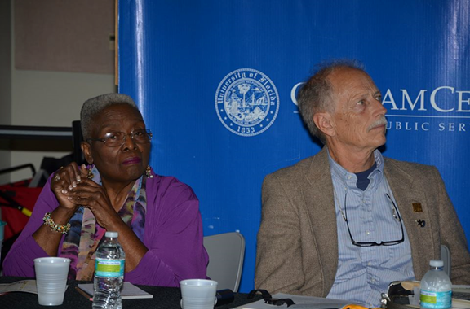
Dan Harmeling, a mathematics instructor at Sante Fe College, remains active in the civil rights movement in Florida. As a UF student in the early 1960s, Harmeling was a member of the Student Group for Equal Rights (SEGR) and organized against segregation in Gainesville. Harmeling recounted the day the SEGR organized a student picket against discrimination at the University College Inn, a popular student restaurant. Remembered by many local civil rights workers, the picket was launched to encourage the desegregation of Gainesville businesses. Harmeling also engaged in active recruitment of black students once he and friends realized that their university was supplying scholarships for students to attend Florida A&M instead of UF.
The activist legacy of Harmeling’s brother, Jim, was also honored in a display that featured family photos and newspaper clippings. A second display highlighting the community organizing work of staff and faculty activists, including Bob Canney, in the 1960s and 1970s was also featured during the reception.
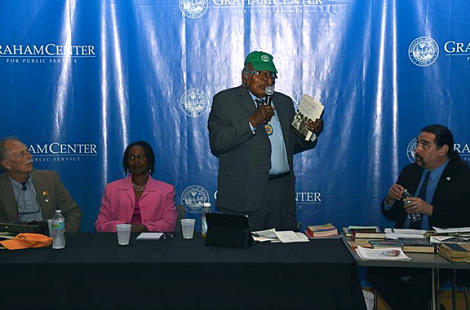
Rosemary Florence, a retired history teacher, recalled her experiences of being involved in civil rights as a middle school student. Florence told the audience of the overt racism in Ocala compared to Jacksonville, where she attended elementary school. For Florence, civil rights work was a family affair and everyone participated as foot soldiers in the movement. Florence quoted Ron Brown to explain that the struggle continues and it is through our hearts, that change can be realized. “What is race? It is something to be run. There is one race. It is the human race.” This statement aligns with the words of Harmeling and Due who both noted the power of white and black civil rights workers working together.
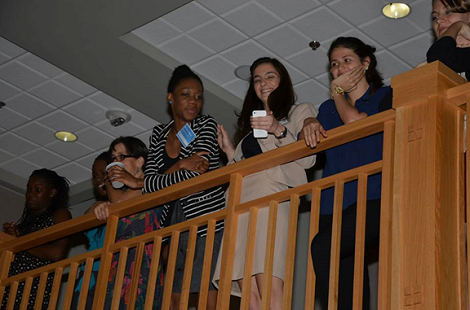
John Due graduated from Florida A&M Law School and began actively working in the Civil Rights Movement in 1963. Due took depositions of African Americans denied the right to register to vote in McComb, Mississippi. Like Rosemary Florence, Due emphasized the importance of family in his work for civil rights. While on a book selection committee for K-12 schools in Miami-Dade County, Due and his wife became unsatisfied with the lack of literature on Florida civil rights. Their dissatisfaction spurred his wife and daughter to write a book in 2003. During the Q&A portion, the panelists stressed the need for leadership and personal story-telling to keep the struggle for civil rights alive.
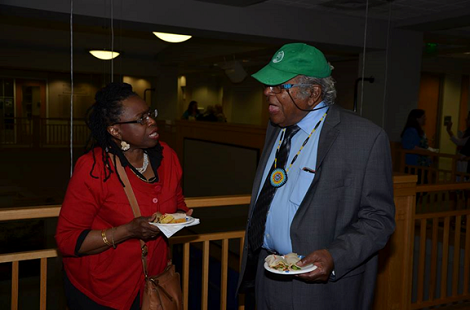
Throughout the event, the audience audibly affirmed their appreciation and agreement in the points and stories expressed by the panelists. The Ocora room in Pugh Hall was filled with different generations of civil rights workers, teachers, and community members who coalesced in their appreciation of the efforts of many in the room fight inequality. After the panel, audience members gathered over delicious food and drinks to continue the discussion on “where do we go from here?”
Many thanks to SPOHP’s co-sponsors, Center for Humanities and the Public Sphere Rothman Endowment, UF’s African American Studies Program, UF Center for Women’s Studies, UF Smathers Libraries, Bob Graham Center for Public Service, UF’s Office of Lesbian, Gay, Bisexual, and Transgender Affairs, Institute of Hispanic-Latino Cultures, and the UF Office of the Provost for contributing to the engaging event.
